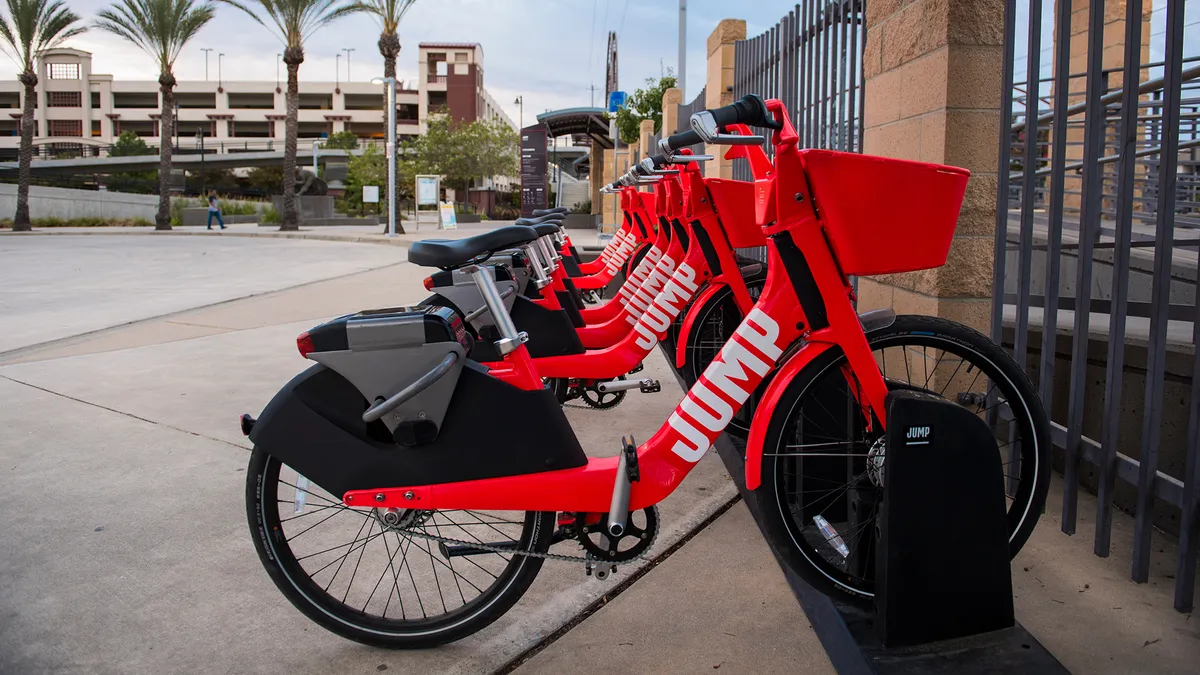Dive Brief:
- Uber on Tuesday filed a federal lawsuit against the Los Angeles Department of Transportation (LADOT) over its Mobility Data Specification (MDS), which requires micromobility operators to provide the agency with real-time vehicle data. The lawsuit escalates the ongoing battle between Uber and the city over its Jump bikes and scooters, which intensified earlier this year with an appeal to a hearing officer that was found in favor of LADOT.
- In its complaint, Uber argues MDS is a violation of the U.S. Constitution’s Fourth Amendment, which forbids unlawful searches and seizures. The company accuses LADOT of real-time rider surveillance, which could reveal personally identifying information about anyone. "In this manner, LADOT could gather detailed information about a person, such as where they live and work, where they go for social or romantic interactions, and even what time they leave their office each day," the complaint reads.
- In a Medium post to accompany the lawsuit’s filing, Uber's Chief Privacy Officer Ruby Zefo said MDS "signifies a decisive step towards the continuous, unregulated surveillance of our users." Zefo said they want to find an alternative data-sharing standard that does not jeopardize personal privacy. Officials with LADOT did not respond to Smart Cities Dive's requests for comment.
Dive Insight:
Zefo's post notes that Uber and LADOT have spent 18 months "searching for a compromise," which has resulted in a dramatic saga. In its federal court filings, Uber submitted the transcript of the hearing, arguing that over the course of questioning, "LADOT dissembled and its reasoning collapsed."
The company also said that real-time data collection is not an appropriate way for cities to plan infrastructure and other efforts.
"Real-time in-trip geolocation data does not assist the city in planning bike lanes, or figuring out deployment patterns in different neighborhoods, or dealing with complaints about devices that are parked in the wrong place, or monitoring compliance with permit requirements," the complaint reads. "It is a tool for surveillance."
LADOT and other MDS supporters have repeatedly pointed out that all other micromobility companies in the city comply with the rules as laid out. An agency spokesperson told the Wall Street Journal that Uber has recently begun complying with the same rules it is challenging in court.
LADOT has continued to stand by its MDS requirements as a way to encourage equity and make effective planning decisions. Agency officials have also bemoaned the apparent breakdown in their relationship with Uber, and say they would prefer to have a greater spirit of cooperation.
"It's not my preference," LADOT general manager Seleta Reynolds said during the CoMotion LA conference last November. "I would much, much rather be at the table, which we are with a lot of these other companies, learning together and figuring out together how to make this work best for everyone."
Uber's complaint asks the court to find MDS unlawful under state and federal law and calls for it to prevent LADOT from revoking Jump's permit to operate. The agency is likely to file a response soon.












